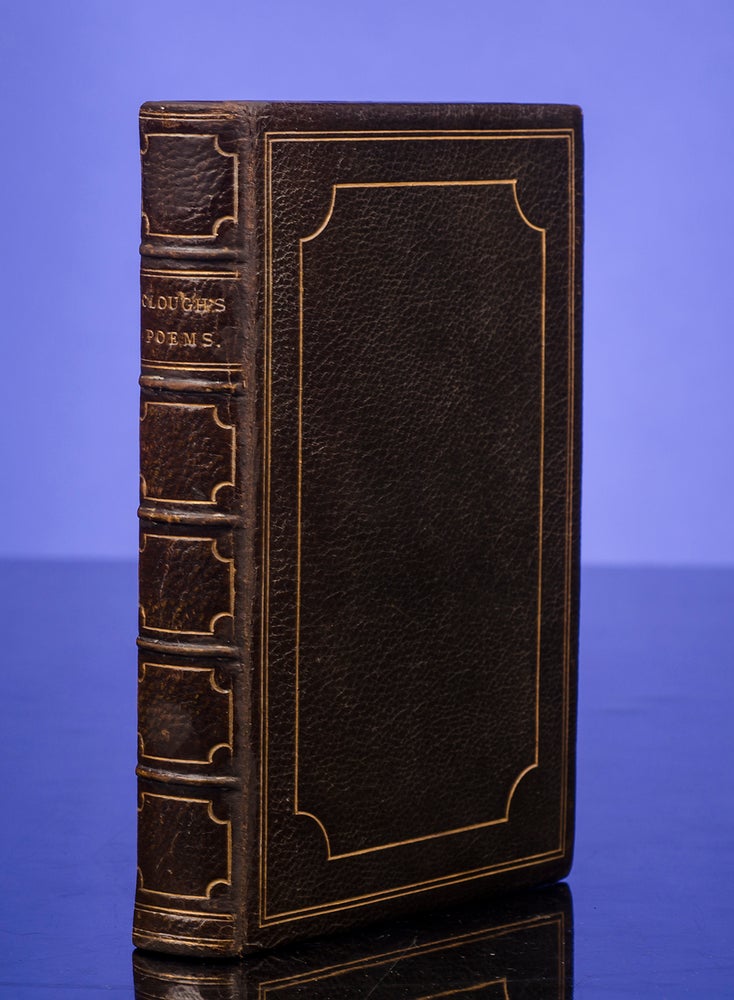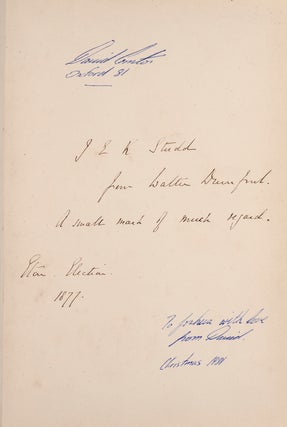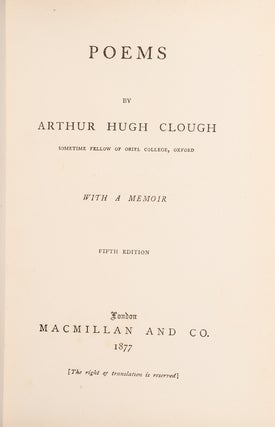Poems
London: Macmillan and Co., 1877. Item #03474
Poems by Arthur Clough
Florence Nightingale's Devoted Assistant
CLOUGH, Arthur Hugh. Poems. With a Memoir. Fifth edition. London: Macmillan and Co., 1877.
Octavo (6 1/2 x 4 7/16 inches; 166 x 113 mm.). xxiv, 350 pp.
Contemporary full olive green morocco, covers with tripe-gilt rules, spine with five raised bands, decoratively ruled and lettered in gilt in compartments, pale yellow coated endpapers, all edges gilt. Various ink inscriptions on front flyleaf. Near fine.
Arthur Hugh Clough (1819-1861) was an English poet, an educationalist, and the devoted assistant to ground-breaking nurse Florence Nightingale. He was the brother of suffragist Anne Clough, who became principal of Newnham College, Cambridge.
Clough's output was small and much of it appeared posthumously. Anthony Kenny notes that the editions prepared by Clough's wife, Blanche, have "been criticized ... for omitting, in the interests of propriety, significant passages in Dipsychus and other poems." But editing Clough's literary remains has proven a challenging task even for later editors. Kenny goes on to state that "it was no mean feat to have placed almost all of Clough's poetry in the public domain within a decade, and to have secured for it general critical and popular acclaim." His long poems have a certain narrative and psychological penetration, and some of his lyrics have a strength of melody to match their depth of thought.
He has been regarded as one of the most forward-looking English poets of the 19th century, in part due to a sexual frankness that shocked his contemporaries. He often went against the popular religious and social ideals of his day, and his verse is said to have the melancholy and the perplexity of an age of transition, although Through a Glass Darkly (pp. 54/55), suggests that he did not lack certain religious beliefs of his own, and in particular a belief in the afterlife where the struggle for virtue will be rewarded. His work is interesting to students of meter, owing to the experiments which he made, in The Bothie and elsewhere, with English hexameters and other types of verse formed upon classical models.
Clough is perhaps best known now for his short poems Say Not the Struggle Naught Availeth (p. 345), a rousing call to tired soldiers to keep up the good fight, Through a Glass Darkly (pp. 54/55), an exploration of religious doubt, and The Latest Decalogue, a satirical take on the Ten Commandments. The Latest Decalogue's (pp. 142/143) couplet on murder, "Thou shalt not kill; but need'st not strive/Officiously to keep alive:" is often quoted - usually out of context - in debates on medical ethics in the sense that it is not right to struggle to keep terminally ill people alive, especially if they are suffering.
Price: $225.00

 I have been in the rare and antiquarian book business for over forty years; my family has been in the rare books business since 1876. Rare books are in my blood.
I have been in the rare and antiquarian book business for over forty years; my family has been in the rare books business since 1876. Rare books are in my blood.


